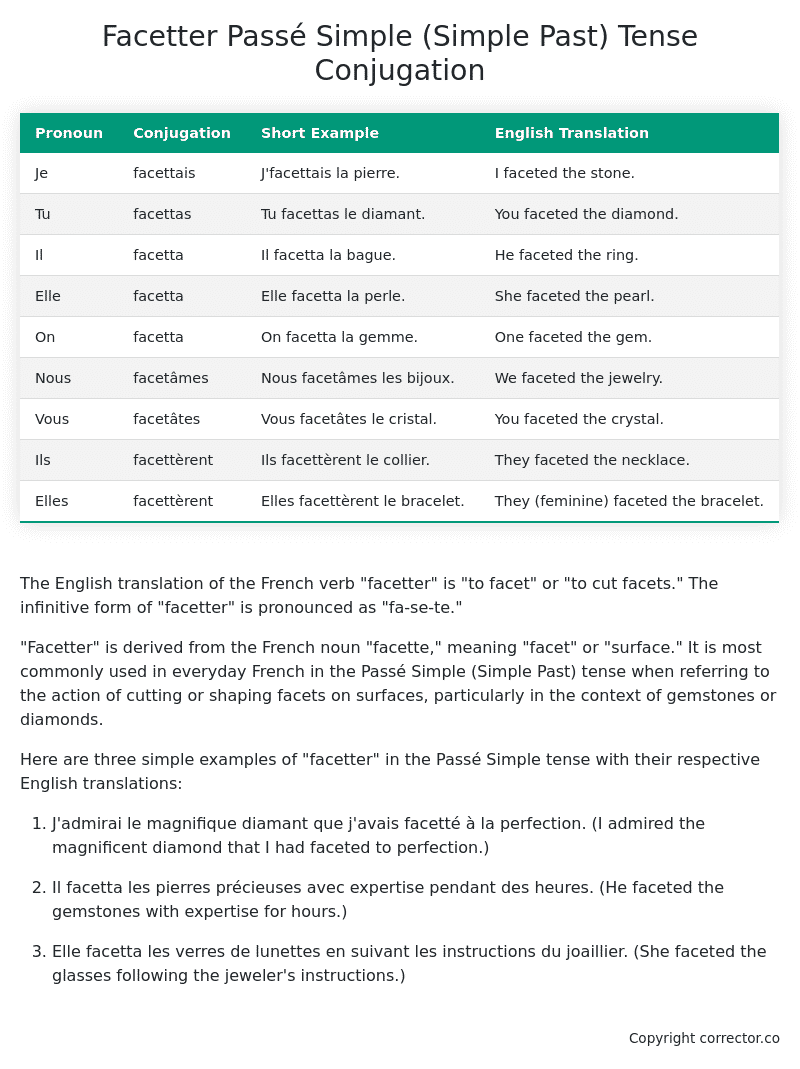Passé Simple (Simple Past) Tense Conjugation of the French Verb facetter
Introduction to the verb facetter
The English translation of the French verb “facetter” is “to facet” or “to cut facets.” The infinitive form of “facetter” is pronounced as “fa-se-te.”
“Facetter” is derived from the French noun “facette,” meaning “facet” or “surface.” It is most commonly used in everyday French in the Passé Simple (Simple Past) tense when referring to the action of cutting or shaping facets on surfaces, particularly in the context of gemstones or diamonds.
Here are three simple examples of “facetter” in the Passé Simple tense with their respective English translations:
-
J’admirai le magnifique diamant que j’avais facetté à la perfection.
(I admired the magnificent diamond that I had faceted to perfection.) -
Il facetta les pierres précieuses avec expertise pendant des heures.
(He faceted the gemstones with expertise for hours.) -
Elle facetta les verres de lunettes en suivant les instructions du joaillier.
(She faceted the glasses following the jeweler’s instructions.)
Table of the Passé Simple (Simple Past) Tense Conjugation of facetter
| Pronoun | Conjugation | Short Example | English Translation |
|---|---|---|---|
| Je | facettais | J’facettais la pierre. | I faceted the stone. |
| Tu | facettas | Tu facettas le diamant. | You faceted the diamond. |
| Il | facetta | Il facetta la bague. | He faceted the ring. |
| Elle | facetta | Elle facetta la perle. | She faceted the pearl. |
| On | facetta | On facetta la gemme. | One faceted the gem. |
| Nous | facetâmes | Nous facetâmes les bijoux. | We faceted the jewelry. |
| Vous | facetâtes | Vous facetâtes le cristal. | You faceted the crystal. |
| Ils | facettèrent | Ils facettèrent le collier. | They faceted the necklace. |
| Elles | facettèrent | Elles facettèrent le bracelet. | They (feminine) faceted the bracelet. |
Other Conjugations for Facetter.
Le Present (Present Tense) Conjugation of the French Verb facetter
Imparfait (Imperfect) Tense Conjugation of the French Verb facetter
Passé Simple (Simple Past) Tense Conjugation of the French Verb facetter (You’re reading it right now!)
Passé Composé (Present Perfect) Tense Conjugation of the French Verb facetter
Futur Simple (Simple Future) Tense Conjugation of the French Verb facetter
Futur Proche (Near Future) Tense Conjugation of the French Verb facetter
Plus-que-parfait (Pluperfect) Tense Conjugation of the French Verb facetter
Passé Antérieur (Past Anterior) Tense Conjugation of the French Verb facetter
Futur Antérieur (Future Anterior) Tense Conjugation of the French Verb facetter
Subjonctif Présent (Subjunctive Present) Tense Conjugation of the French Verb facetter
Subjonctif Passé (Subjunctive Past) Tense Conjugation of the French Verb facetter
Subjonctif Imparfait (Subjunctive Imperfect) Tense Conjugation of the French Verb facetter
Subjonctif Plus-que-parfait (Subjunctive Pluperfect) Tense Conjugation of the French Verb facetter
Conditionnel Présent (Conditional Present) Tense Conjugation of the French Verb facetter
Conditionnel Passé (Conditional Past) Tense Conjugation of the French Verb facetter
Conditionnel Passé II (Conditional Past II) Tense Conjugation of the French Verb facetter
L’impératif Présent (Imperative Present) Tense Conjugation of the French Verb facetter
L’impératif Passé (Imperative Past) Tense Conjugation of the French Verb facetter
L’infinitif Présent (Infinitive Present) Tense Conjugation of the French Verb facetter
L’infinitif Passé (Infinitive Past) Tense Conjugation of the French Verb facetter
Le Participe Présent (Present Participle) Tense Conjugation of the French Verb facetter
Le Participe Passé (Past Participle) Tense Conjugation of the French Verb facetter
Struggling with French verbs or the language in general? Why not use our free French Grammar Checker – no registration required!
Get a FREE Download Study Sheet of this Conjugation 🔥
Simply right click the image below, click “save image” and get your free reference for the facetter Passé Simple tense conjugation!

Facetter – About the French Passé Simple (Simple Past) Tense
Formation
Usage
Narration
Historical Context
Interactions with other tenses
Passé Composé
Imparfait
Conditional and Subjunctive
Summary
I hope you enjoyed this article on the verb facetter. Still in a learning mood? Check out another TOTALLY random French verb conjugation!

